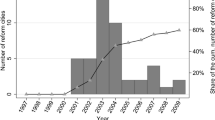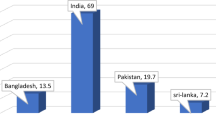Abstract
Previous research on foreign workers in the oil-rich Gulf countries indicates that the origins of some of the major problems encountered by these workers are found in the labor and residence laws and regulations. An initial investigation revealed that exploitation of foreign workers is facilitated by the powers granted to the employer by the sponsorship system. Data used in this research were obtained from available information about foreign workers in Saudi Arabia. Results obtained here confirm that unscrupulous employers abuse the sponsorship system to deprive their foreign employees of their rights. A number of measures to remedy this situation are recommended.
Similar content being viewed by others
References
Abdul Rahman, A. (1983). In Farjani, N. (Ed.),Foreign Labor in Arab Gulf Countries, Proceedings of the Seminar Organized by the Arab Unity Studies Center and the Arab Institute of Planning in Kuwait. 78. Beirut: Arab Unity Studies Center (in Arabic).
Al-Bunyan, A.S., & Lutfi, T.I. (1980).Industrialization and Immigration: A Social Study of Industrial Workers in Riyadh and Their Adjustment to the Urban Life Style. Riaydh, Saudi Arabia: Social Research and Documentation Unit, University of Riyadh (in Arabic).
Al-Farris, A. F. (1983). The role of the private sector in the employment of foreign labor in the United Arab Emirates. In Farjani, N. (Ed.),Foreign Labor in Arab Gulf Countries, Proceedings of the Seminar Organized by the Arab Unity Studies Center and the Arab Institute of Planning in Kuwait, 151–156.Beirut:Arab Unity Studies Center (in Arabic).
Al-Kasimi, K.M. (1987).Manpower and Population in the United Arab Emirates. Paris: Editions Oueidat (in Arabic).
Al-Mabouth, M. H. (1987).Educational Administration in the Kingdom of Saudi Arabia. Al-Qasseem, Saudi Arabia: Al-Qasseem Press (in Arabic).
Al-Moosa, A., & McLachlan, K. (1985).Immigrant Labor in Kuwait. London: Croom Helm.
Al-Najjar, B. (1983). Working and living conditions of foreign workers. In Farjani, N. (Ed.),Foreign Labor in Arab Gulf Countries, Proceedings of the Seminar Organized by the Arab Unity Studies Center and the Arab Institute of Planning in Kuwait. 83–101. Beirut: Arab Unity Studies Center (in Arabic).
Al-Tamimi, A. K. (1983). Political impact of foreign migration. In Farjani, N. (Ed.).Foreign Labor in Arab Gulf Countries, Proceedings of the Seminar Organized by the Arab Unity Studies Center and the Arab Institute of Planning in Kuwait, 287–308. Beirut: Arab Unity Studies Center (in Arabic).
Atiyyah, H. S. (1990).Working in the Gulf. Plymouth: Northcote House, forthcoming.
Birks, J.S., & Sinclair, C. A. (1980).International Migration and Development in the Arab Region. Geneva: ILO.
Daher, A.J., & Al-Salem, F. (1985).Manpower in the Arab Gulf Countries: A Field Study. Kuwait: AlSalassil (in Arabic).
The Economist Intelligence Unit (1984).Annual Supplement: Saudi Arabia. London: The Economist.
Ezz Al-Deen, A., Abdul Maguid, N. M., & Khalil, S. A. (1977).Labor and Laborers in the Arabian Gulf Baghdad, Iraq: Arab Labor Office (in Arabic).
Farjani, N. (1983). Size and structure of labor force and population. In Farjani, N., (Ed.),Foreign Labor in Arab Gulf Countries, Proceedings of the Seminar Organized by the Arab Unity Studies Center and the Arab Institute of Planning in Kuwait. 19–30. Beirut: Arab Unity Studies Center (in Arabic).
Farjani, N. (1988).Searching for a Living: A Field Study of Egyptian Immigrant Workers in Arab Countries. Beirut: Arab Unity Studies Center (in Arabic).
Ibrahim, S. (1982).The New Arab Order: A Study of the Social Impact of Oil Wealth. Beirut: Arab Unity Research Center (in Arabic).
Kingdom of Saudi Arabia, Ministry of Planning. (1985).Fourth Development Plan. Riyadh: Ministry of Planning (in Arabic).
Labeeb, A. (1983) Causes of widespread employment of Asian Labor. In Farjani, N. (Ed.),Foreign Labor in Arab Gulf Countries, Proceedings of the Seminar Organized by the Arab Unity Studies Center and the Arab Institute of Planning in Kuwait, 19–30.Beirut: Arab Unity Studies Center (in Arabic).
Miller, M. J. & Martin, P. L. (1982).Administering Foreign Worker Programs. Lexington, Ma: Lexington Books.
Moon, C. I. (1986). Korean contractors in Saudi Arabia: Their rise and fall.The Middle East Journal, 40(4), 614–633.
Sarhan, B., Bassam, D., Abdul Bassit, A., Abdul Kassem, A. & Farjani, N. (1983). Information file on foreign labor in Arab Gulf countries. In Farjani, N. (Ed.).Foreign Labor in Arab Gulf Countries. Proceedings of the Seminar Organized by the Arab Unity Studies Center and the Arab Institute of Planning in Kuwait, 556–681. Beirut: Arab Unity Studies Center (in Arabic).
State of Bahrain, Ministry of Labor and Social Affairs. (1982).The Impact of Foreign Domestic Servants on Bahraini Families.Bahrain:Social Affairs Division (in Arabic).
Author information
Authors and Affiliations
Rights and permissions
About this article
Cite this article
Atiyyah, H.S. The sponsorship system and infringements of the rights of foreign workers in the Gulf countries. Employ Respons Rights J 3, 267–276 (1990). https://doi.org/10.1007/BF01384933
Issue Date:
DOI: https://doi.org/10.1007/BF01384933




